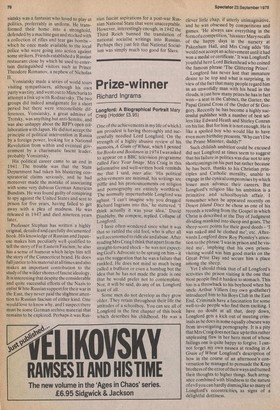Prize-winner
Richard Ingrams
Longford: A Biographical Portrait Mary Craig (Hodder £5.95) One of the achievements in my life of which I am proudest is having thoroughly and successfully needled Lord Longford. On the strength of a highly abusive review of his memoirs, A Grain of Wheat, which I penned for Books and Bookmen in 1974 I was asked to appear on a BBC television programme called Face Your Image. Mrs Craig in this informative and well-written book reminds me that I said, inter alia: 'His political achievements are minimal, his writings are piffle and his pronouncements on religion and pornography are entirely worthless.' The normally imperturbable Longford was aghast. 'I can't imagine why you dragged Richard lngrams into this,' he stuttered. think actually it was your idea,' David Dimbleby, the compere, replied. Collapse of Longford.
I have often wondered since what it was that so rattled the old fool, who is after all well accustomed to ridicule and abuse. After reading Mrs Craig I think that apart from the straight-forward shock — he was not expecting God's Advocate to be sprung on him — it was the suggestion that he was a failure that rankled. He does not mind so much being called a buffoon or even a humbug but the idea that he has not made the grade is one that he would prefer not to contemplate. Nor, it will be said, do any of us. Longford least of all.
Some men do not develop as they grow older. They retain throughout their life the attitudes of a schoolboy. You can see all of Longford in the first chapter of this book which describes his childhood. He was a clever little chap, if utterly unimaginative, and he was obsessed by competitions and games. 'He always saw everything in the form of a competition,' his sister Mary recalls of the happy days in the nursery at Pakenham Hall, and Mrs Craig adds 'He would not accept an achievement until it had won a medal or certificate.' It was Longford's youthful hero Lord Birkenhead who coined the famous phrase 'The Glittering Prizes'. Longford has never lost that immature desire to be top and what is surprising, in view of the fact that many people regard him as an unworldly man with his head in the clouds, is just how many prizes he has in fact won — a seat in the Cabinet, the Garter, the Papal Grand Cross of the Order of St Gregory. Recently he has become a highly suc cessful publisher with a number of best sel lers like Edward Heath and Shirley Conran on his list. But for him it is not enough. He is like a spoiled boy who would like to have even more birthday presents. 'Why can't I be the Prime Minister, daddy?'
Such childish ambition could be excused did not Longford at times seem to suggest that his failure in politics Was due not to any shortcomings on his part but rather because he has been, thanks to his Christian prin ciples and Catholic morality, unable to engage in the cynical compromises by which lesser men advance their careers. But Longford's religion like his ambition is a primitive and schoolboyish affair. I remember when he appeared recently on Desert Island Discs he chose as one of his records a reading from the Gospel in which Christ is described at the Day of Judgment dividing mankind into sheep and goats. The sheep score points for their good deeds — 'I was naked and he clothed me', etc. After wards Longford drew Roy Plomley's atten tion to the phrase was in prison and he visited me', implying that his own prison visiting would win him good marks on the Great Prize Day and secure him a place among the sheep.
Yet I should think that of all Longford's activities the prison visiting is the one that most people find it hardest to stomach. This too is a throwback to his boyhood when his uncle Arthur Villiers (my own godfather) introduced him to his Boys Club in the East End. Criminals have a fascination for some well-to-do people who find them exciting. I have no doubt at all that, deep down, Longford gets a kick out of meeting criminals as he does in some equally obscure way from investigating pornography. It is a pity that Mrs Craig does not face up to this rather unpleasing flaw in her hero most of whose failings one is quite happy to forgive. I cannot forget my own nausea at reading in A Grain of Wheat Longford's description of how in the course of an afternoon's con versation he managed to persuade the Kray brothers of the error of their ways and turned their thoughts to higher things. Such arrog ance combined with blindness to the nature of evil you can hardly dismiss,like so many of Longford's eccentricities as signs of a delightful dottiness.


































































































 Previous page
Previous page